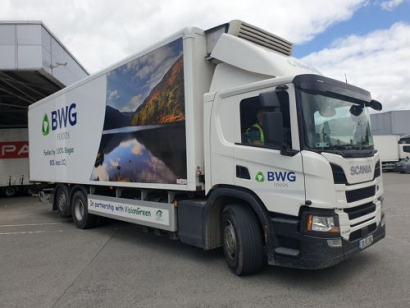
BWG Foods, owners and operators of the SPAR, EUROSPAR, Londis, MACE and XL brands, has launched an initial fleet of two Heavy Goods Delivery Vehicles (HGV’s) fueled with biogas in place of traditional diesel fuel, with ambitions to further increase the use of biogas as part of their increasingly environmentally-friendly fuel mix. The vehicles will deliver a 90% reduction in transport related carbon emissions.
The launch of the biogas trucks with electric fridge units, which each cost in the region of €180,000, follows a partnership between BWG and two Irish start-ups – VisionGreen and Generation Green – and represents the most significant development in terms of green transport in Ireland this year.
The trucks are the most efficient transport vehicles across the sector and are also the quietest, meaning less noise pollution across towns and city centers. The first two of BWG Foods’ biogas fueled trucks will lead to a reduction of 200 tons of carbon emissions annually by the business.
In addition to the launch of its fleet, BWG will also contribute food waste from their 240,000 sq. ft .National Distribution Center at Kilcarbery to the biogas production site at Nurney, County Kildare, making this a circular solution.
In the last 12 months, the Group has invested heavily in sustainability measures to lower the carbon footprint of its delivery operations and currently has the largest fleet of CNG (compressed natural gas) powered trucks in operation in Ireland, with plans to increase this from 18 to 50 by 2025.
Biogas, which is produced by the natural breakdown of food and sewage waste, has been designated as one of the Future Fuel of Choice by the Irish Government with greater investment and incentives planned for the increased production of biogas in Ireland. It is also the fuel of choice for BWG Foods into the future given sufficient availability and supports
Speaking about the launch, Joanne Mellon, logistics director, BWG Foods, said, “We at BWG are very passionate about finding new solutions that can reduce our environmental impact and given the significant scale of our business, and the expansive supply chain operation that supports it, it is critically important that we invest in new technologies that allow us to pioneer less carbon intensive methods of delivery.”
John Pakenham, director, Vision Green, said, “The aim of our work is to support the business sector to make more sustainable choices and, with greater planning and investment, Ireland has huge potential for developing Renewable Gas. We have partnered with the only existing producer, Green Generation in Nurney Kildare, to bring this pilot to life, to help demonstrate the benefits of Renewable Gas as a transport fuel.”
As part of its wider supply chain sustainability program, BWG Foods has also implemented a number of operational efficiency projects that have already led to collective CO2 emission savings of 3,200 metric tons per year for the last four years. This included a re-routing program which led to the reduction of more than 2.3 million kilometers travelled annually and an increase of individual delivery vehicle capacity by 15%. The business also introduced double deck trailers to reduce the number of journeys being made.

